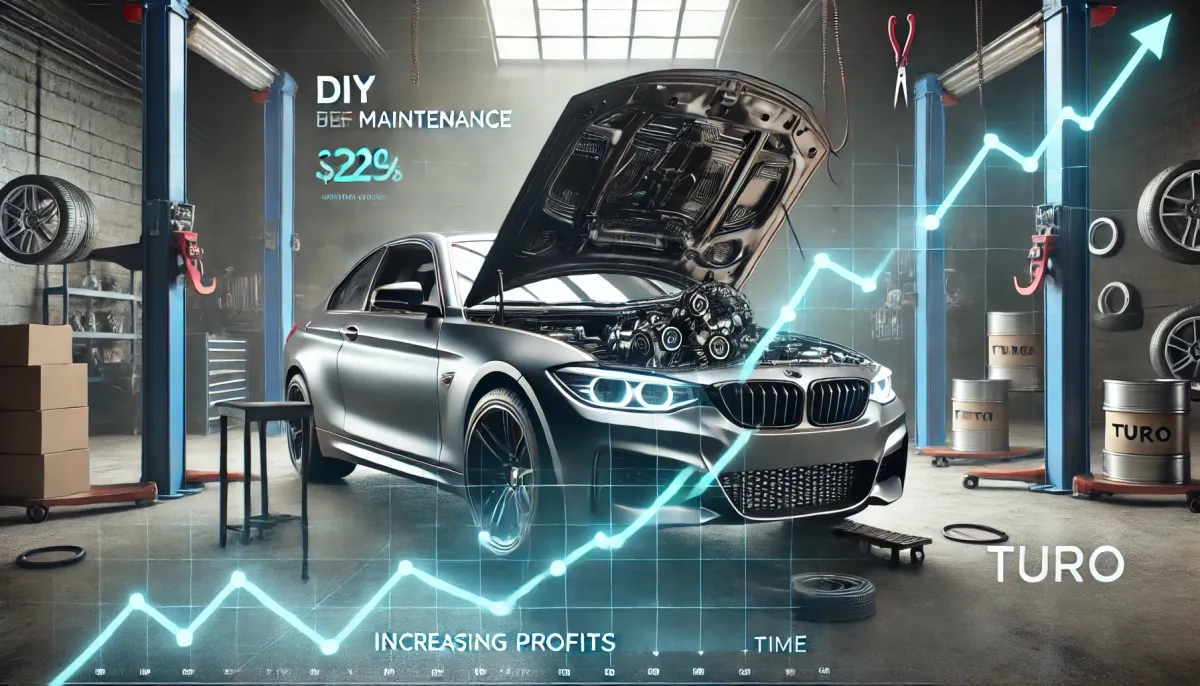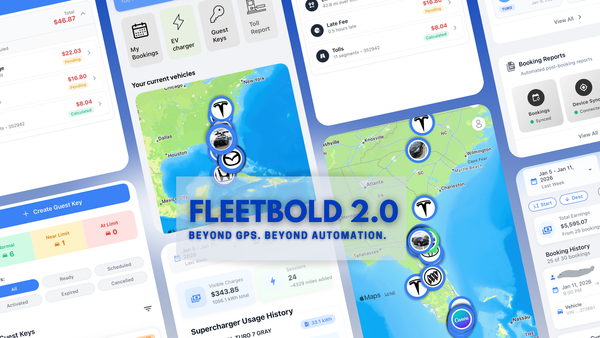Cost-Saving Strategies for Turo Hosts: Simple Ways to Boost Your Profits
This blog explores the importance of reducing operational costs for Turo hosts, focusing on simple DIY maintenance strategies like oil changes and tire rotations to increase profitability and improve the guest experience.

Why Reducing Operational Costs Is Essential for Turo Hosts
As a Turo host, minimizing operational costs is key to maximizing your profitability and maintaining a sustainable business model. When you reduce expenses, you can reinvest more into your vehicles, your business, and ultimately, increase your income. With the rising costs of maintenance, fuel, and insurance, the ability to manage your operational costs effectively is more important than ever. Reducing these costs doesn’t just help you save money—it allows you to provide a higher quality service to your guests, boost your reputation, and increase the number of bookings.
One of the most powerful ways to cut costs is by taking on basic vehicle maintenance tasks yourself. While it may seem intimidating at first, learning simple maintenance skills can save you hundreds, even thousands of dollars annually. This allows you to pass the savings on to your business, invest in more cars, or simply keep more money in your pocket.
Minimizing Expenses to Maximize Profitability
Reducing Operational Costs: A Key to Success
Operating a fleet of cars on Turo comes with several expenses. From routine vehicle maintenance and insurance to cleaning, marketing, and fuel costs, the outflows can quickly add up. However, managing these expenses wisely can significantly increase your bottom line. One of the most effective ways to cut down on operational costs is by performing basic vehicle maintenance on your own.
- Professional Maintenance Costs: Routine services, such as oil changes, tire rotations, and air filter replacements, can cost anywhere from $50 to $200, depending on your vehicle’s make and model and the service center's pricing. With multiple cars in your fleet, these costs can quickly become burdensome.
- DIY Maintenance Savings: By learning how to perform these simple tasks yourself, you can cut these expenses down by up to 80%, if not more. For example, an oil change that costs $70 to $115 in a service shop may cost only $30 if you do it yourself.
Reducing expenses in areas like maintenance, fuel, and insurance allows you to put more money towards marketing, improving customer experience, and expanding your fleet.
The Benefits of DIY Oil Changes
Cost Comparison: Professional vs. DIY Oil Changes
Oil changes are one of the most common and essential maintenance tasks required for any vehicle. Professional oil changes are an expense that can quickly add up, especially if you have several vehicles in your fleet. Here's a breakdown of how much money you could save by performing oil changes yourself:
- Professional Oil Change Cost: The average cost for a professional oil change is between $70 and $115, which includes both labor and oil. For vehicles that require synthetic oil, the cost tends to be on the higher end of this range. The added labor costs, especially in premium service centers, can also increase the overall price.
- DIY Oil Change Cost: On the other hand, performing an oil change on your own costs around $30 for basic materials (oil, oil filter, and necessary tools). This is a significant saving, especially when you multiply it by the number of vehicles in your fleet.
Long-Term Savings
Let’s say you have five cars in your fleet, and each requires an oil change every 3,000 to 5,000 miles. Performing your own oil changes rather than paying for professional services can save you anywhere from $200 to $400 each month, depending on the number of cars and frequency of oil changes. These savings can be reinvested into business growth, advertising, or future maintenance needs.
Added Convenience and Flexibility
Perform Maintenance at Your Convenience
When you rely on service centers for maintenance, you are at the mercy of their schedules. Professional service shops often require an appointment and can take hours or even days to complete repairs. This means you have to plan ahead, arrange transportation, and, most importantly, keep your vehicles off the market, resulting in lost income.
- Convenience of DIY Maintenance: By performing maintenance tasks yourself, you can choose when and where to carry them out. You no longer need to schedule appointments or wait for hours at a service center. You can carry out oil changes, tire rotations, and other basic repairs at a time that suits you, ensuring that your vehicles are always available for bookings.
- Flexibility and Control Over Your Schedule: The flexibility of DIY maintenance is invaluable. You can handle repairs in between bookings or during off-peak hours. If a vehicle needs a simple oil change, you don’t have to sacrifice a day of income waiting at a service center. Keeping your vehicles on the road and available for guests helps maximize your earnings.
Keep Vehicles Available for Bookings
One of the most important things to consider as a Turo host is vehicle availability. A car that is frequently in the shop for maintenance is a car that isn’t earning you money. DIY maintenance allows you to keep your vehicles ready to rent, which is essential for maintaining a steady stream of income.
Other Cost-Saving Repairs
While oil changes are among the most common DIY tasks, there are other simple repairs and maintenance tasks that you can perform to reduce your reliance on expensive professionals.
Replacing Air Filters
Air filters are one of the easiest parts to replace yourself. Changing the air filter is critical for maintaining engine efficiency and fuel economy. A clogged air filter can reduce fuel efficiency and put unnecessary strain on the engine. Fortunately, replacing an air filter only takes a few minutes and can cost less than $20 for the part. By doing this yourself, you can save the $40 to $60 it would cost to have a mechanic do it.
Brake Pads
Replacing brake pads is an essential maintenance task for ensuring the safety and reliability of your vehicle. While it’s not a task to take lightly, it is relatively easy to do with a bit of knowledge and the right tools. The cost of replacing brake pads professionally can range from $150 to $300 per axle, but doing it yourself can reduce the cost to under $100. This not only saves money but ensures that your vehicles remain in top working condition.
Tire Rotations
Tire rotation is essential for ensuring even wear on your tires. Most vehicles require tire rotations every 6,000 to 8,000 miles. This service can cost $30 to $50 at a shop, but it is relatively simple to do on your own with a jack and a tire iron. Regular tire rotation can extend the life of your tires and improve the overall performance of your vehicle, reducing the need for costly tire replacements.
Enhancing Guest Experience Through Maintenance
Proactive Maintenance to Avoid Breakdowns
By staying ahead of maintenance issues and addressing them before they become significant problems, you can greatly enhance your guests’ experience. Proactive maintenance ensures that your vehicles remain in good working condition and reduce the likelihood of breakdowns during a rental. A vehicle breakdown, especially during a guest’s trip, can lead to negative reviews, loss of income, and damage to your reputation.
Well-Maintained Vehicles Get Higher Ratings
Guests are more likely to leave positive reviews when they feel that the vehicle they rented is safe, reliable, and performs well. Well-maintained cars not only lead to higher ratings, but they also encourage repeat bookings, which is key to maintaining a steady income. A guest who experiences a smooth and trouble-free rental is much more likely to return for future bookings.
Maximizing Long-Term Profitability
Minimize Maintenance Expenses to Boost Overall Earnings
The longer you can keep your vehicles running smoothly without having to pay for expensive repairs, the more profitable your Turo business becomes. DIY maintenance significantly reduces the amount you spend on routine vehicle upkeep. By dedicating some time to learning basic car maintenance skills, you can keep your cars in good shape while avoiding unnecessary service fees.
Deliver Exceptional Service Through Well-Maintained Vehicles
One of the most important factors for long-term success on Turo is customer satisfaction. Providing reliable, clean, and well-maintained vehicles is one of the best ways to ensure that your guests have a positive experience. The better the service, the more likely your guests are to leave glowing reviews, which will help attract more bookings and establish your reputation as a top host.
Conclusion
Reducing operational costs is essential for increasing profitability as a Turo host. By performing basic vehicle maintenance tasks yourself, such as oil changes, brake pad replacements, and tire rotations, you can significantly cut down on expenses. The savings can then be reinvested into your business, whether that means upgrading your fleet, improving guest experiences, or expanding your operations. DIY maintenance not only helps improve your bottom line but also increases the reliability and availability of your vehicles, leading to higher ratings and repeat bookings.
By staying proactive and taking control of your maintenance routine, you can ensure the long-term profitability and success of your Turo business. This approach leads to a well-maintained fleet, satisfied customers, and a sustainable source of income that will continue to grow over time.
FAQ
How much can I save by performing oil changes myself?
Performing your own oil changes can save you $40-$85 each time, depending on the service cost. Over time, this adds up to significant savings, especially if you have multiple vehicles.
What other repairs can I do myself to save money?
Tasks like replacing air filters, brake pads, and rotating tires are easy to learn and can save you hundreds of dollars per year.
Does DIY maintenance affect guest satisfaction?
Yes, regular DIY maintenance ensures that your vehicles run smoothly and reliably, leading to higher ratings and more repeat bookings.
How can I maximize profitability on Turo with reduced operational costs?
By performing maintenance yourself and reducing service costs, you can keep more of your earnings. This allows you to reinvest in your business, upgrade your fleet, and ensure your vehicles are available for more bookings.
Is it difficult to learn DIY car maintenance?
No, many basic car maintenance tasks are relatively simple to learn. You can find online tutorials and guides that will walk you through each process step-by-step.





